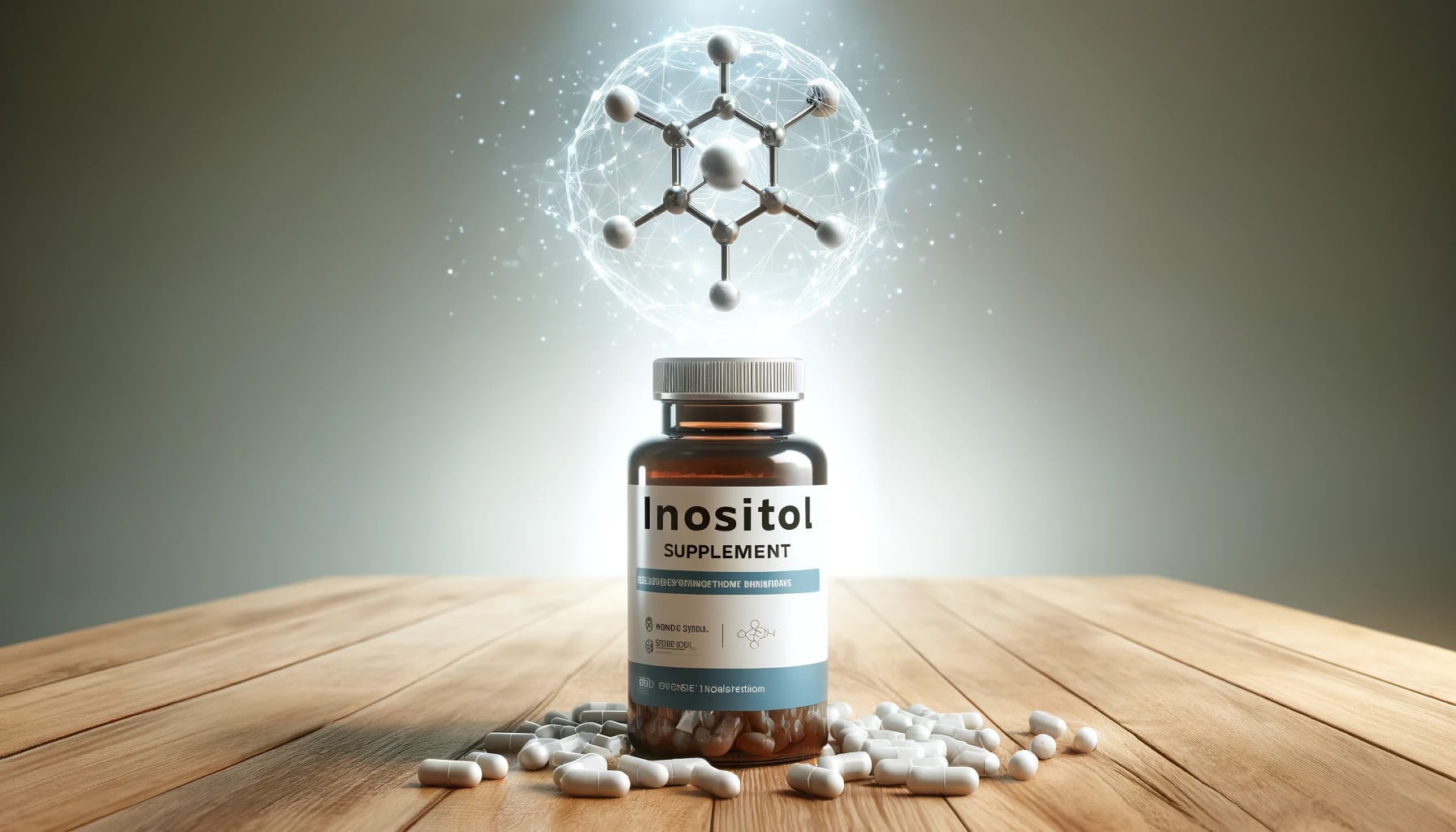
Inositol, a naturally occurring carbohydrate, is a powerful nootropic with diverse cognitive benefits.
Found abundantly in our food and synthesized within the human body, inositol is great for maintaining optimal mental clarity, alleviating mood, and boosting your memory.
With a growing market value and positive user experiences, inositol supplementation offers promising results for those seeking cognitive enhancement and mental health support.
Table of Contents
What Is Inositol?
Inositol is a sugar alcohol prevalent in foods like fruits, beans, grains, and nuts, and is also synthesized in the kidneys.
Its most bioactive form, myo-inositol, is a pseudo-vitamin often grouped with the B-vitamin complex. It helps in cellular signaling, membrane formation, and neurotransmitter modulation.

Inositol has been used to enhance memory and mental clarity, reduce anxiety and depression, and manage conditions like OCD and panic disorder.
Its supplementation is suggested for those seeking to increase their memory and retention capabilities, and those with mental health conditions.
The global inositol market was valued at $137 million in 2019, growing since, at the rate of 7.5%; qualifying inositol as the most sought-after supplementation among health-conscious consumers and mental health patients.(1)
What Are the Health Benefits of Inositol?
The vast scope of health benefits, ranging from better brain health to metabolic support are well documented through research and personal experiences.
Below are some of the key health benefits of inositol applications:
- Cognitive Enhancement: Neurotransmitter modulation
- Metabolic Support: Improves insulin sensitivity
- Heart Health: Lipid metabolism, reducing triglyceride and LDL cholesterol levels
- Reproductive Health: Enhances fertility
- Skin Health: Reduces acne
How Does Inositol Improve Cognitive Function: What Is Its Mechanism of Action?
The specific biochemical pathways through which inositol exerts its therapeutic effects have been well studied. Inositol affects several mechanisms in the brain through the following actions:
- Neurotransmitter Modulation: Synthesizes neurotransmitters like serotonin and dopamine
- Second Messenger Signaling: Improves intracellular (stress) signaling pathways (e.g. inositol triphosphate (IP3) and diacylglycerol (DAG))
- Cellular Membrane Integrity (as phospholipids): Enhances neuronal function and signal transduction
- Antioxidant Activity: Exhibits antioxidant properties, protection from oxidative stress and neuroinflammation
The variety of Inositol’s multifaceted mechanisms of action contribute to its ability to enhance and support overall brain health.
What Are the Nootropic Benefits of Inositol?
Inositol has potent effects on mood, learning, motivation, and energy levels.

Can Inositol Enhance Mood and Reduce Anxiety?
Inositol modulates neurotransmitter levels in the brain, contributing to mood regulation and emotional stability.(2)
During periods of heightened stress, inositol also mitigates the physiological effects of stress and anxiety through intracellular response pathways, particularly the hypothalamic-pituitary-adrenal (HPA) axis.
Studies have shown that inositol reduces cortisol levels (a stress hormone), favorably impacting mood and anxiety symptoms.(3)
How Does Inositol Affect Memory and Learning?
Inositol derivatives, particularly IP3 and DAG, modulate synaptic transmission pathways, which facilitate the encoding and retrieval of memory, as well as neuronal plasticity associated with learning.(4)
Moreover, inositol synthesizes phospholipids, ensuring inter-cellular fluidity, provide proper neuronal function and signal transduction, which supports memory formation and retention.(5)
Additionally, inositol reduces oxidative damage, which preserves neuronal integrity and brain functions, particularly in old age and neurodegenerative diseases.(6)
How to Use Inositol?
Inositol is available in various forms, including powder, capsules, and liquid. Each form offers unique advantages, catering to individual preferences and needs.
But, it is also important to track inositol’s use and look out for any unwanted changes to the body.

What Are the Recommended Dosages for Inositol?
The recommended dosage of inositol varies depending on the intended use and individual factors, such as age, weight, and health status.
For general cognitive and mood support, typical dosages range from 500 mg to 2 grams per day.
Remember, it is essential to consult with a healthcare professional to determine the appropriate dosage for your needs.
How Should Inositol Be Taken for Maximum Benefit?
For maximum benefit, inositol should be taken consistently and as directed by a healthcare professional. Here are some tips for optimal usage:
- Consistent Dosage: Same time each day to maintain steady blood levels
- Combination Therapy: Can be combined with other supplements or medications
- Meal Timing: Take with meals to enhance absorption
- Monitoring: Regularly check symptoms
What Are the Potential Side Effects of Inositol?
While inositol is well-tolerated by most individuals, some side effects may occur, especially at higher doses:
- Gastrointestinal Distress (nausea, bloating, diarrhea)
- Headaches
- Dizziness
- Allergic Reactions (rash, itching, swelling)
It bodes well with users to understand its assimilation with other medications, while simultaneously monitoring their own experience.
Can Inositol Interact with Medications?
Inositol may interact with certain medications. Following is a broad description of such interactions:
- Lithium: Reduces lithium levels in the body
- Selective Serotonin Reuptake Inhibitors (SSRIs): Enhance serotonin activity, and risk of serotonin syndrome
- Carbamazepine and Valproate: Interacts with mood stabilizers
- Warfarin: Interacts with anticoagulants
Who Should Avoid Using Inositol?
While generally safe, certain populations should avoid inositol supplementation, including:
- Pregnant or breastfeeding women
- Individuals with bipolar disorder
- People on lithium therapy
- Individuals with known allergies to inositol
- Children
Can Inositol Be Safely Combined with Other Supplements?
Inositol can be combined with various nootropic supplements to improve absorption, digestion, and potency. A few suggestions and their impacts are shared below:
- 5-HTP: Enhances serotonin activity, leading to serotonin syndrome
- Vitamin B Complex: Safely combined in most cases
- Omega-3 Fatty Acids: Improves symptoms of mood disorders, favorable effects on neurotransmitter function and inflammation reduction
- Magnesium: Helps manage anxiety and stress, regulates neurotransmitter activity
- Melatonin: Improves sleep quality, and reduces symptoms of insomnia
What Are Common User Experiences and Reviews About Inositol?
Inositol supplementation for cognitive benefits has garnered positive reviews from many users. Common experiences include improved mental clarity and reduced anxiety.
One user noted, “Inositol has significantly improved my focus and reduced my anxiety levels.”
Another shared, “I started taking inositol for brain fog, and I’ve noticed a substantial increase in my ability to concentrate.”
However, some users report that results can vary and may take several weeks to become noticeable.
Overall, the consensus is that inositol can be a beneficial supplement for enhancing cognitive function and managing stress and anxiety.
- Grand View Research. “Inositol Market Size, Share & Trends Analysis Report by Application.” Grand View Research, 2020.↩
- Levine, J., et al. “Controlled trials of inositol in psychiatry.” European Neuropsychopharmacology, vol. 7, no. 2, 1997, pp. 147-155.↩
- Benjamin, J., et al. “Inositol treatment in psychiatry.” Psychopharmacology Bulletin, vol. 40, no. 3, 2010, pp. 45-57.↩
- Berridge, M. J. “Inositol trisphosphate and diacylglycerol: two interacting second messengers.” Annual Review of Biochemistry, vol. 58, no. 1, 1989, pp. 989-1009.↩
- Haughey, N. J., et al. “Disruption of inositol 1,4,5-trisphosphate-mediated calcium signaling in cerebral cortical neurons by amyloid β-peptide.” Journal of Neuroscience, vol. 20, no. 15, 2000, pp. 6063-6074.↩
- Agrawal, R., et al. “Inositol and its derivatives: their emerging role in the treatment of human diseases.” Frontiers in Pharmacology, vol. 8, 2017, article 98.↩
